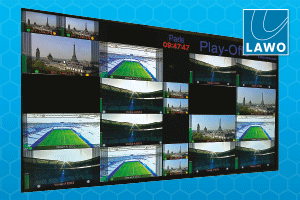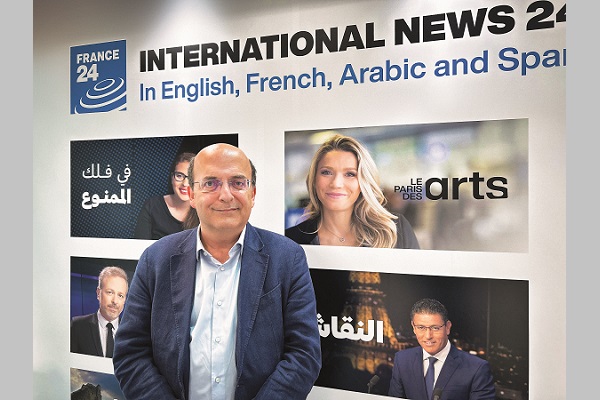Ahmed El Cheikh, MENA Distribution and International Development Director at France Médias Monde, shares insights on the network's regional interests and audience expansion strategies in an interview with BroadcastPro ME on the sidelines of the ASBU festival in Tunis.
What is your role in the French-Arabic broadcasting space?
I oversee the development and distribution of a group called France Médias Monde, which serves as the holding company for various entities. This group includes France 24, a TV and news channel broadcasting in English, French, Arabic and Spanish. We also have Radio France International RFI, broadcast in 18 languages, and Monte Carlo Doualiya, an Arabic-language radio station operating in 16 countries in the Arab world.
We recently participated in the ASBU Convention and Festival in Tunisia to give greater focus to our Arabic audiences, particularly in Tunisia, Morocco and Algeria. France 24, our news broadcaster, has a significant presence in these three countries, and we aim to increase our visibility here. Additionally, we are interested in expanding our presence in the Middle East and ensuring that France 24 is easily available across all platforms.
What do you offer Arabic audiences in terms of programming?
France 24 has programmes specifically targeted at our Arabic-speaking viewers. We prioritise the Arab world with our 24-hour radio programming in Arabic through Monte Carlo Doualiya, which offers a mix of news, music and general entertainment. We also have a special focus on health-related content. We have a popular show hosted by one of our journalists, Sonitta Nader, which addresses health-related queries. It is particularly well-received during the evening commute.
Do you have a revenue model?
We are funded through VAT (value-added tax) rather than a state budget, which makes us independent despite being a public broadcaster. Accuracy and the fight against fake news are central to our values, as the geopolitical landscape has undergone significant changes, necessitating caution in reporting news, especially in Africa and the Arab world.
But we don’t have a revenue model. We are heavily focused on delivering accurate news, so there isn’t a conventional business model for that. Our main goal is to reach as many viewers as possible. We rely on journalists worldwide to cover political issues and provide balanced perspectives. We host more than 60 guests every day across our three Paris-based channels. Each channel operates 24 hours a day, 365 days a year. Our dedicated team of journalists ensures we find the right people for each show, emphasising the importance of this aspect.
“Accuracy and the fight against fake news are central to our values, as the geopolitical landscape has undergone significant changes, necessitating caution in reporting news, especially in Africa and the Arab world”- Ahmed El Cheikh, MENA Distribution and International Development Director, France Médias Monde
How do you view the evolving TV landscape in the GCC and the wider Arab region?
We have seen a significant shift from traditional linear TV to emerging over-the-top (OTT) platforms. This technological change presents new challenges that we must address as a media network. For this, we have two main objectives in the region. Firstly, we want to ensure that France 24 is available on all platforms, including streaming. This will allow us to reach a wider audience and adapt to the changing media landscape. Secondly, we aim to increase our visibility in key countries such as Tunisia, Morocco and Algeria, as well as the GCC. We are already well-established in the first group of countries, but we want to further solidify our position and offer more localised content.
In North Africa, our audience studies show that we reach people of 15 years and above, but in the Levant and the Middle East, our audiences are in the age group of 45-55. We want to be able to change that. We are available free-to-air on all linear platforms.
France 24 Arabic has journalists in and from North Africa. That’s why we are attractive to the audience there. And we have made our programmes with our audience in mind. The Arab world has a very young population, and we want to find a new way of telling news and stories, so they also come on board. So our focus is on strengthening our partnerships with local broadcasters, media organisations and production companies, to create content that resonates with the audience in each country.
Do you have reporters in the GCC?
This is something we lack. We are looking to source good journalists from Saudi Arabia, which is the main market, and from Yemen, Kuwait, the UAE and so on. They need to understand some French though, because they will be working out of our Paris office.
What do you foresee as the biggest challenge for the network to expand?
Funding. When you are well-funded, you can expand and open new offices, which we don’t have in the GCC. We may have something there soon, but for now it is under wraps. We opened an office in Dakar, Africa, because in French-speaking Africa we have a strong presence. We opened an office in Bucharest to cover the Russian-Ukrainian situation. But the GCC has been a challenge. Another big challenge is our inability to reach more radio audiences due to the non-availability of DAB+. Most stations are still heavily reliant on FM, and that hasn’t changed much.
Do you have any audience statistics to share with us?
Based on the studies we have done annually in six or seven countries in the Arab world, we have 20m viewers in the Arab world. For Monte Carlo, we have 9m listeners weekly in the Arab world.
Which platforms are you currently available on?
At present, we are available on satellite platforms in the UAE and are in discussions with streaming platforms like Shahid. We have also initiated discussions with StarzPlay, as our focus on expanding our presence on these platforms will be a key priority in the coming years.
How do you address concerns about bias in news reporting?
Bias is a significant concern in the media industry, and we take it very seriously. Our priority is to provide accurate and impartial news coverage. We have a team of experienced journalists from diverse backgrounds who strive to present balanced perspectives. We have editorial guidelines in place to ensure objectivity and fact-checking. Our journalists follow strict ethical standards and undergo regular training. Additionally, we have internal checks and balances to maintain the accuracy and integrity of our reporting.




































































